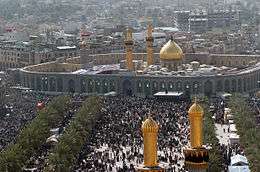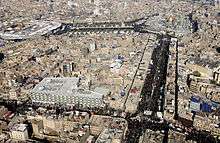Arba'een Pilgrimage
| Arba'een Pilgrimage | |
|---|---|
|
Millions of Muslims gather around the Husayn Shrine in Karbala after making a pilgrimage on foot during Arba'een | |
| Status | active |
| Genre | religious gathering |
| Date(s) | Arbaeen, 20th Safar |
| Frequency | Annually |
| Country | Iraq, Iran, Nigeria, UK, US |
| Participants | Shia muslims, Some Sunnis, Christians, Hussaini Brahmin, Yazidis etc |
| Capacity | Unlimited |
| |
|---|
 |
|
|
The Arba'een Pilgrimage is the world's largest public gathering that is held every year.[1][2] This Ziyarah[3] is held at the end of the 40-day mourning period following Ashura, the religious ritual for the commemoration of the Prophet Mohammad's grandson Hossein ibn Ali's death in 680.[4][5] Arba'een marks a "pivotal event in history"[6] in which the pilgrims make their journey to Karbala on foot,[7] where Husayn ibn Ali, the third Imam of Shia, and his army were killed and beheaded by the army of Yazid I.[1] Some of the pilgrims make their journey from cities as far as Basra, about 500 km away by road.[8]
Background
Jabir ibn Abd Allah was the first pilgrim of Husayn ibn Ali in the Arba'een of 61 AH. According to narrations, the custom of performing the pilgrimage on foot was forgotten during a time period after Morteza Ansari and it was revived by Mirza Husain Noori Tabarsi in an Eid al-Adha who repeated this action every year performing the last one by 1319 AH. Some other scholars and Marja's kept on the same manner in Arba'een up to the Saddam's time[10] during which the pilgrimage was banned although some people used to perform it secretly. It was revived just after Saddam's overthrow in 2003.[5][10]
Analysis
By 2014, over 19 million people from 40 countries of the world participated in this occasion,[11][12][13] making it the second largest gathering in the world.[12] The figure reached 22 million pilgrims by 2015, according to Iraqi state-run media.[14] By 2016, according to al-Khoei Foundation, almost 22 million pilgrims gathered in Iraq, 10 percents more than 2014.[15] Even though the Hindu Kumbh Mela is larger in population, it is only held every three years, and hence the Arbaeen pilgrimage is the largest gathering held annually.[1]
Some Sunnis, Christians, Yazidis and people of other faiths also participate the festival.[1] Ali Moamen, Academic and former director of Al Najaf Satellite TV Channel, said:
"What is interesting about this human crowd is that all society segments take part in it. Despite its religious character, nonreligious people also participate in it, in addition to illiterates and holders of high academic degrees, and ordinary people and leaders of the country."[16]
According to Sayed Mahdi al-Modarresi, writing for The Huffington Post:
Arbaeen should be listed in the Guinness Book of World Records in several categories. The biggest annual gathering, longest continuous dining table, largest number of people fed for free, largest group of volunteers serving a single event, all under the imminent threat of suicide bombings.[11]
The pilgrims face dangers such as "attacks that have been blamed on Sunni extremists, who have routinely targeted the pilgrims" using car bombs or rockets.[7] The pilgrimage is performed under "tightened security" guarded by tens of thousands of Iraqi police and soldiers backed by armored vehicles and military helicopters to protect the pilgrims.[4] Iranian advisers also help protect the visitors through a joint operation room.[17] On 20 November 2015, a major bombing plot in Hussainiya in Iraq, Baghdad was foiled by the Iraqi police, where 18 booby-trapped dolls were seized by the security forces. Stuffed with bombs, were meant to be scattered on the roads leading to Karbala during Arbaeen.[18][19]
Political dimensions
The ritual is no longer considered a purely cultural ceremony while ISIL, the group who regards Shia as apostate, has launched a wide offensive in Iraq, and hence the presence of such a large population of Shia is of a political importance.[20][21] According to Ali Mamouri writing in Al-Monitor, the pilgrimage is "a show of force against those hostile to the rise of the Shia in the region." After the fall of Mosul to the ISIL "and the subsequent massacres of Shia soldiers and civilians", the gathering took a political form for the first time for the Shia, who use the mourning rituals as a way to condemn injustice and express their social power. "The second sign of Arbaeen's political shift was the regional message conveyed by Shia to their opponents: The Shia Crescent," Mamouri added. As the third sign he pointed to "a message exchanged between regional forces" and "unprecedented Iranian presence" which has led to "a feeling of solidarity between Arab and non-Arab Shia."[21]
Mawakibs and free services
.jpg)
Along the roads to Karbala, many Mawakibs are devised with the aim of providing "accommodation, food and beverage and medical services,"[16] and practically anything else the pilgrims need for free.[22] Seven thousand of such mawakeb were set up in city of Karbala in 2014.[23] Besides Iraqi Mawakibs, which are unofficially organized, there are some Iranian ones which are less "specifically targeted" but pilgrims are from various regions.[3]
Around the world
Besides Iraq, the pilgrimage is performed annually around the word in countries such as UK, US and Nigeria.[24]
UK
The "Husaini Islamic Trust UK", organizes the procession in UK where thousands of people take part and the organizers decided to condemn terrorism following the recent ISIS attacks in Paris in 2015. Mr Waqar Haider, the organizer, said that the procession failed to gain coverage by the mainstream media because of the "stereotyping". "I think it's because of stereotyping. People see the entire Muslim community as one community," he said.[24]
Nigeria
Shia Muslims in west of Africa can't take themselves to Karbala because it is very far for them. So, the Pilgrims from Nigeria, Ghana, Chad, Cameroon, Benin and Togo head toward Zaria in Kaduna State, northern Nigeria to be addressed by the Shia cleric Ibrahim Zakzaky.[25]
Surveys
Surveys are done to study Shi'a muslims via both "traditional survey instruments and experimental methods."[3] The survey included topics such as "religion and politics, democracy, women’s rights, regional conflict and Iran’s nuclear agreement."[26] Experimental methods were employed to investigate the "latent perspectives" of pilgrims towards "sensitive topics," including "Iran’s nuclear program, and attitudes toward the West, China and Russia."[3]
In the News
In 2016, Asharq al-Awsat, a London-based daily paper, issued a report regarding Arba'een pilgrimage which was proven to be false, according to Agence France-Presse.[27] The "Saudi-owned" paper said that according to World Health Organization report "unplanned pregnancies and [...] disease" are seen "following the arrival of scores of unregulated Iranians to take part in the annual Shia pilgrimage to Karbala." According to the article, 169 unmarried women had become pregnant from the Iranian pilgrims.[28]
UN’s health agency rejected the claim of issuance of such a report by WHO. WHO "slammed" the allegations of Asharq al-Awsat and condemned mentioning its name in what it called an "unfounded" news.[27][29] According to Rana Sidani, spokeswoman for the WHO, the organization was "shocked" by Asharq al-Awsat's report. In a TV interview, she said that they were "consulting with the Iraqi ministry of health" on possible legal action against the paper."[30] Haider al-Abadi, Iraqi Prime Minister, and "several other leading Shiite figures" condemned the Asharq al-Awsat's reprot and demanded an "apology".[27]
See also
References
- 1 2 3 4 Piggott, Mark. "20 Million Shia Muslims Brave Isis by Making Pilgrimage to Karbala for Arbaeen". IBtimes. Retrieved 6 October 2015.
- ↑ "World's Biggest Pilgrimage". huffingtonpost.co.uk. Retrieved 24 November 2014.
- 1 2 3 4 Christia, Fotini; Dekeyser, Elizabeth; Knox, Dean. "Shiites are participating in the world's largest pilgrimage today. Here's how they view the world.". Washington Post. Retrieved 24 November 2016.
- 1 2 Rasheed, Ahmed (24 December 2013). "Shi'ites finish Arbaeen pilgrimage in Iraq under tight security". Reuters. Retrieved 3 October 2015.
- 1 2 Staff writers (14 December 2014). "Shia pilgrims flock to Karbala for Arbaeen climax". BBC.
- ↑ Staff writers (3 January 2015). "Millions of pilgrims mark religious festival of Arbaeen". Euronews. Retrieved 5 October 2015.
- 1 2 Karadsheh, Jomana (12 January 2012). "Shiite pilgrims make their way to Iraqi holy city amid tight security". CNN. Retrieved 3 October 2015.
- ↑ Staff. "Millions of pilgrims throng Iraq's Karbala". Aljazeera. Retrieved 8 December 2015.
- ↑ "Millions of Shia Muslims from across the globe have come together in the Iraqi city of Karbala to mark the Arbaeen ritual, which marks the 40th day following the seventh-century martyrdom of the third Shia Imam, Imam Hussein, Press TV reports.".
- 1 2 Staff writers. "The background of Arba'een rally/The importance of Najaf-Karbala rally from scholar's viewpoint". Fars News. Retrieved 4 October 2015.
- 1 2 Dearden, Lizzie (25 November 2014). "One of the world's biggest and most dangerous pilgrimages is underway". The Independent. Retrieved 4 October 2015.
- 1 2 Philipson, Alice. "The ten largest gatherings in human history". The Telegraph. Retrieved 3 October 2015.
- ↑ Chandra Kharel, Gopi (13 December 2014). "Arbaeen 2014: 20 Million Pilgrims Flock to Karbala [PHOTOS]". Ibtimes. Retrieved 4 October 2015.
- ↑ Sim, David. "Arbaeen: World's largest annual pilgrimage as millions of Shia Muslims gather in Karbala". IB Times. Retrieved 8 December 2015.
- ↑ Cusack, Robert. "Iraq prepares for biggest Shia-Muslim Arbaeen gathering in history". alaraby. Retrieved 24 November 2016.
- 1 2 Abu Zeed, Adnan. "Hoping for miracles, Shiites walk Iraq's Arbaeen pilgrimage". Retrieved 4 October 2015.
- ↑ GEORGE, SUSANNAH. "Millions of Shiite pilgrims flock to Iraqi holy city for annual Arbaeen commemorations". Retrieved 8 December 2015.
- ↑ Varghese, Johnlee (20 November 2015). "Booby-trapped dolls seized in Baghdad; Isis planned bomb blasts during Arbaeen". International Business Times. Retrieved 21 November 2015.
- ↑ "Iraqi security forces dismantled 18 booby-trapped dolls in Baghdad". Kuwait News Agency. Shuwaikh. 20 November 2015. Retrieved 21 November 2015.
- ↑ Staff writers (12 December 2014). "Iraq security fears as millions of pilgrims gather in Karbala". The National. Agence France-Presse. Retrieved 5 October 2015.
- 1 2 Mamouri, Ali. "Iraqi Shiite pilgrimage takes political turn". Al-Monitor. Retrieved 8 October 2015.
- ↑ al-Modarresi, Sayed Mahdi. "World's Biggest Pilgrimage Now Underway, And Why You've Never Heard of it!". The Huffington Post. Retrieved 8 October 2015.
- ↑ Staff writers (14 December 2014). "Arbaeen pilgrimage in Iraq: 17.5 million defy threat". SBS. Retrieved 6 October 2015.
- 1 2 Sandhu, Serina (9 December 2015). "Muslim anti-Isis march not covered by mainstream media outlets, say organisers". The Independent. Retrieved 18 December 2015.
- ↑ Müller, Friederike. "Nigerian Shiites brave terror threat". Deutsche Welle. Retrieved 18 December 2015.
- ↑ Christia, Fotini; Dekeyser, Elizabeth; Knox, Dean (24 October 2016). "Mapping Shiite Opinion". Foreign Affairs. Retrieved 24 November 2016.
- 1 2 3 "Saudi paper sacks Iraq correspondent over 'fake' report". NST Online. Agence France-Presse. Retrieved 23 November 2016.
- ↑ "Are scores of Iraqi women being impregnated by Iranian pilgrims?". Al Bawaba. 20 November 2016. Retrieved 23 November 2016.
- ↑ "بيان إعلامي: منظمة الصحة العالمية تنفي خبراً كاذباً عن العراق". WHOofficial website. Retrieved 23 November 2016.
- ↑ "WHO: Saudi Media Claims on Iraq Report "Unfounded"". Al manar. Retrieved 23 November 2016.

